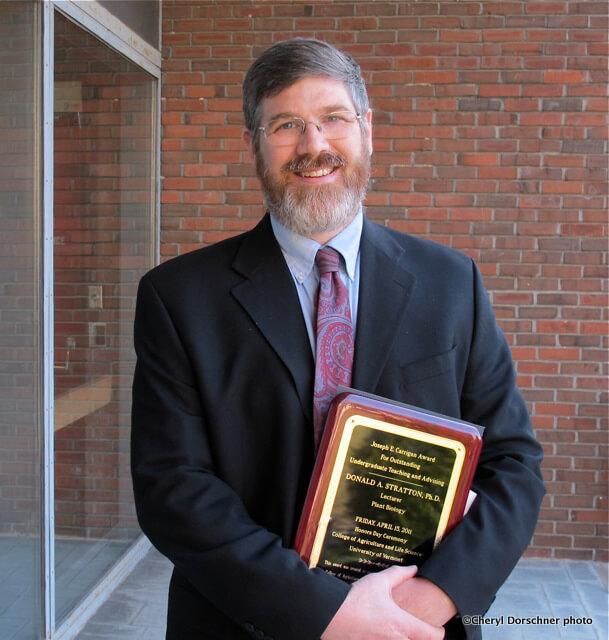Sometimes it is the early adopters of innovative techniques and cutting-edge technology who are also the first to return to the basics. In the case of University of Vermont lecturer Donald Stratton, sometimes, it’s back to the drawing board – the chalkboard, that is.
Don Stratton’s teaching success for the past 13 years is due to his constantly updating course materials and innovating his methods. He has to. He’s the guy who teaches those intense, two-semester core biology courses to majors and non-majors side by side, sometimes one hundred in a class. Stratton has also co-directed the cross-college biological sciences major since 2008 and directed UVM College of Agriculture and Life Sciences honors program. Through these courses and programs, he not only keeps students on their toes and learning foundational science, he often wins them over to become biology or plant sciences majors. Perhaps more importantly, he shapes the curriculum and plays an integral role in the mission of the College of Agriculture and Life Sciences and the University of Vermont at large.
But back to the high-tech approach.
Stratton was a pioneer in using the Internet in the classroom, and now that it’s so common that the trick is to get students to stop using their own electronic devices and pay attention, he’s developed advanced ways to make learning interactive. These days he’s using iClicker – student-held remotes that allow them multiple-choice responses that he can tally instantly.
A colleague sitting in on one of his classes recently observed, “Even those seated in the back rows cruising Facebook, turned their attention to him when he announced an upcoming clicker question. As votes came in Don gave his students hints, encouraged them to discuss the question and maybe change their votes. It worked.” The students were as hooked on the lesson as if they were voting for American Idol or Last Comic Standing.
High Contrast to High Tech.
Yet again, ahead of the crowd, Stratton himself now confesses, “I am slowly moving back toward the chalkboard to keep the focus between me and the students, as opposed to slides and students.”
While other UVM faculty members (and those at more than 3,000 universities) are mastering the latest web-based software called “Blackboard,” Stratton is literally writing on blackboards in his classrooms the old-fashioned way. Perhaps amid today’s cacophony of media and color and PowerPoints, stark black and white – a teacher and his words – gets people’s attention.
Stratton also got the attention of his peers; they nominated him for the UVM College of Agriculture and Life Sciences’ highest teaching award. On April 15, CALS Dean Tom Vogelmann presented Stratton with the Joseph E. Carrigan Award for Excellence in Teaching and Undergraduate Education. He is the award’s 30th annual recipient.
In presenting the award, Vogelmann noted that Stratton is deserving of the award not only for teaching that two-semester, introductory science course to first-year biology majors of vastly differing abilities and backgrounds, he recently took over for a colleague who needed to be absent half-way through a sophomore genetics course.
His supervisor for about seven years, chair of plant biology, Professor David Barrington adds, “it helps that Don is truly brilliant; he has an encyclopedic knowledge of his subject and remarkable ability to think on the spot of ways to represent the subject matter that will resonate with students.”
High Contrast Career Path Too
Stratton’s career has taken some surprising turns.
When he arrived at UVM in 1998 from Princeton University as a research assistant professor, he conducted research on the evolutionary biology and ecological genetics of plant populations. He drew from previous research positions, his Ph.D. in ecology and evolution from the State University of New York at Stony Brook and his bachelor’s degree from Earlham College in Indiana.
But Stratton says, “when I found I was spending more time thinking about how to improve my classes than about my research, I knew it was time to focus my career on the classroom. In 2005, I switched to lecturer and have not regretted the decision. Teaching is the part of my job that makes the most difference in other people’s lives.”
Stratton’s teaching method is distinctive and his teaching philosophy is based, in his own words, on this: “all learning starts by rearranging existing knowledge, so it’s important to have a concrete, accessible starting place on which students can hang new facts.” Stratton typically tells engaging stories to hook students on topics. That role of narrative as a learning tool is how he’s organized the textbook he’s writing, “Case Studies in Ecology and Evolution,” which is on contract with a publisher and being tested in his classes as he writes chapters.
It’s no surprise; his students think he’s the best. His course evaluations from them are top rated. Always.
Student Ellen Slade noted, “a good teacher is marked by the enthusiasm that he holds for his subject. When a professor can stand in front of a class of 100+ surly young adults and dance his way through the light reactions of photosynthesis, it is clear that he has reached this level of esteem.”
Another student, Max Kravitz, summed up Don Stratton like this: “He is a great guy, absolutely willing to answer every question. He gave difficult, but very fair exams and was consistently a very enthusiastic lecturer. Also, he can draw a wicked fast flower with chalk in two hands. I’m serious ask him, it’s a sight to see!”
So that chalk talk turns out to be a memorable method after all. Or maybe it’s the way he dances.
